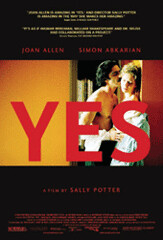Thursday, August 25, 2005

Title: Yes
Cast: Joan Allen, Simon Abkarian, Sam Neil, Shirley Henderson
Director:Sally Potter
Yes opens with a soliloquy to camera by the couple's maid (Shirley Henderson). In poetic terms she dishes the dirt on a crumpling relationship, while fishing an unfaithful condom from the toilet. It is through this veneer that we meet the collapsing couple. Joan Allen's character is listed as "She" in the credits, She and her husband played by Sam Neil are in the end stages of dysfunction. So when they go to a lavish function the husband ignores and isolates her, so She is approached by him. Simon Abkarian is credited as He, and working at the function He approaches her, propositioning this woman on her own.
From there She and He undertake a passionate affair. The film being entirely in verse entirely complimenting the sense of the relationship, as does the performance of the two leads. In film it is rare to see such theatrical performances, most often it will be an adaptation of Shakespeare, so something as contemporary and smart as Yes is quite refreshing and striking. Even if it does at times go a degree or two over the score.
But Yes is more than just the relationship between a man and a woman. It is about marriage, and how it can go wrong, compared with her friend, a single mother. It is about adultery and passion, the raw chemistry of a fresh encounter. It is about the clash of cultures, she is from Belfast and he is from Beirut. It is about Catholics and Muslims and Communists. It is about invisible people, the cleaners that pop up regularly throughout the film, and turn to the audience and offer little biting comments, or just telling looks.
To some degree Yes is a piece of experimental cinema, in that it is all grainy and filtered, regularly jerking and vibrating pictures, even when the camera is not moving. The film is told entirely in verse, layering at times, to deliver voice over monologues, internal running commentaries. Offering breaks in narrative as those cleaners turn and start to talk to the camera. With that Yes comes with mixed results - the narrative side is striking, though some of the tangents/monologues go on a little; while the jerky camera work can become annoying, and migraine inducing.
Sally Potter writes, directs and provides original music for her film. The soundtrack subtle and mostly enhancing, featuring her original music along with the likes of Kronos Quartet and Philip Glass. The film is mostly filmed in London, though over the course of the film we manage to take trips to somewhere in America, to Belfast, Beirut and Havana. Yes is consciously art cinema, and despite some of the issue discussed, I thoroughly enjoyed the film.
Comments:
Post a Comment
 this is the voice of re:mote induction.
this is the voice of re:mote induction.